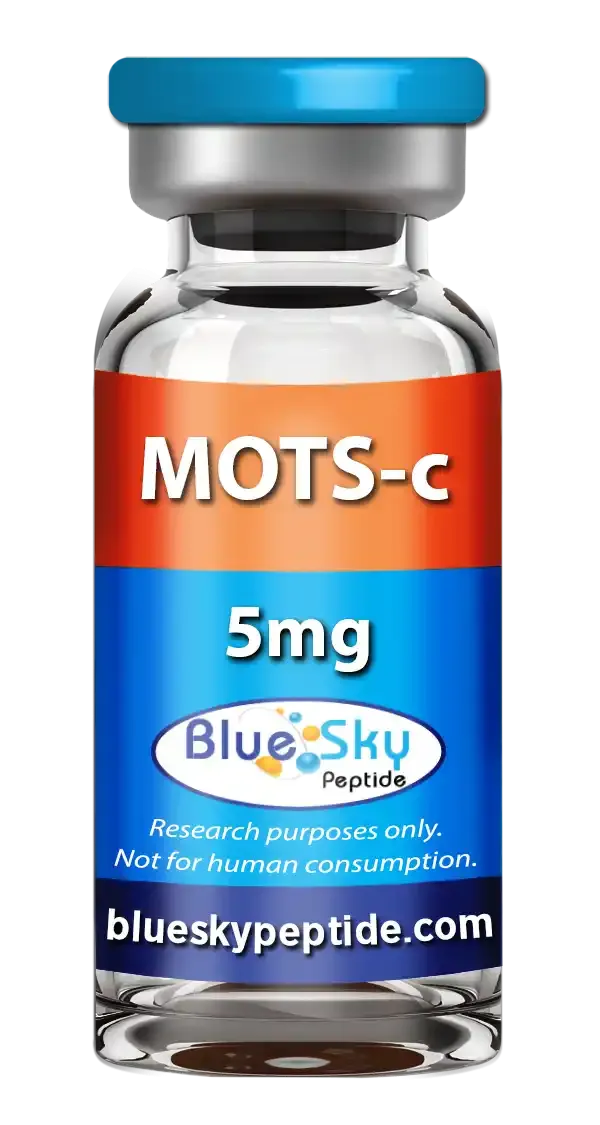45% Off Everything*
Save Now!!

| Unit Size | 5 mg/vial |
| Unit Quantity | 1 vial |
| Purity (Mass Spectrometry and UV) | 99.6% |
| Sequence | Met-Arg-Trp-Gln-Glu-Met-Gly-Tyr-IIe-Phe-Tyr-Pro-Arg-Lys-Leu-Arg |
| Molecular Formula | C101H152N28O22S2 |
| Appearance | Lyophilized White Powder |
| Source | Chemical Synthesis |
| Storage |
Lyophilized Mots-C 5mg is Stable at room Temperature for 90 days, however it is best to storer in a freeze below - 8c for any extended period of time. After reconstitution Mots-C 5mg should be refrigerated at temperatures not to exceed 35 F. |
| Terms | The products we offer are intended for laboratory research use only. Please familiarize yourself with our terms of service prior to ordering. |
MOTS-c 5mg, short for Mitochondrial ORF of the 12S rRNA Type-C, is a 16-amino acid peptide originating from the mitochondrial genome's 12S rRNA region. Mitochondrial-derived peptides (MDPs) exhibit a diverse array of physiological functions.(1)
Studies involving mice revealed that MOTS-c has a significant impact on inflammatory responses. Experimental setups included the measurement of pro-inflammatory and anti-inflammatory factors in the serum of mice after MOTS-c treatment. Results indicated a notable reduction in pro-inflammatory factors and an increase in anti-inflammatory factors upon MOTS-c administration. Additionally, the peptide exhibited an ability to reduce pain in mice, as evidenced by decreased licking time in the formalin test. The analgesic and anti-inflammatory effects were associated with the activation of the AMPK pathway and inhibition of the MAP kinase/c-Fos pathway, as demonstrated by changes in phosphorylation levels and gene expression. Overall, these findings highlight MOTS-c's potential in modulating inflammatory processes in animal models.(2-4)
MOTS-c's role in regulating metabolic conditions like obesity and diabetes was explored in various studies. These investigations typically involved assessing MOTS-c levels in relation to metabolic parameters such as insulin sensitivity, glucose utilization, and body weight. Results consistently showed associations between MOTS-c levels and improved metabolic outcomes, including enhanced insulin sensitivity, glucose balance, and prevention of weight gain.(5)Additionally, MOTS-c was implicated in promoting glucose utilization, inhibiting oxidative stress, and protecting against endothelial dysfunction, highlighting its potential therapeutic value in addressing metabolic disorders and related complications.(6) Moreover, studies suggested a link between MOTS-c and longevity, with findings indicating that higher MOTS-c levels may be beneficial in delaying aging-related metabolic decline and associated diseases.(1)
MOTS-c's involvement in mitochondrial signal transduction pathways was investigated in cellular and animal models. Experimental setups included examining the effects of MOTS-c on mitochondrial gene expression, AMPK activation, and cellular stress responses. Results revealed that MOTS-c can improve mitochondrial function, enhance stress resistance, and regulate nuclear gene expression by interacting with transcription factors.(7) The peptide's ability to modulate cellular responses to metabolic stress underscores its potential as a therapeutic agent for age-related diseases and metabolic disorders. Moreover, studies suggested that MOTS-c may exert protective effects against cardiovascular diseases by improving heart structure and function, promoting angiogenesis, and reducing inflammation, highlighting its multifaceted roles in maintaining cardiovascular health.(8)
References: 1. Zheng Y, Wei Z, Wang T. MOTS-c: A promising mitochondrial-derived peptide for therapeutic exploitation. Front Endocrinol (Lausanne). 2023;14:1120533. 2. Lee C, Zeng J, Drew BG, et al. The mitochondrial-derived peptide MOTS-c promotes metabolic homeostasis and reduces obesity and insulin resistance. Cell Metab. 2015;21(3):443-454. 3. Yin X, Jing Y, Chen Q, Abbas AB, Hu J, Xu H. The intraperitoneal administration of MOTS-c produces antinociceptive and anti-inflammatory effects through the activation of AMPK pathway in the mouse formalin test. Eur J Pharmacol. 2020;870:172909. 4. Yang B, Yu Q, Chang B, et al. MOTS-c interacts synergistically with exercise intervention to regulate PGC-1α expression, attenuate insulin resistance and enhance glucose metabolism in mice via AMPK signaling pathway. Biochim Biophys Acta Mol Basis Dis. 2021;1867(6):166126. 5. Lee C, Zeng J, Drew BG, et al. The mitochondrial-derived peptide MOTS-c promotes metabolic homeostasis and reduces obesity and insulin resistance. Cell Metab. 2015;21(3):443-454. 6. Yang B, Yu Q, Chang B, et al. MOTS-c interacts synergistically with exercise intervention to regulate PGC-1α expression, attenuate insulin resistance and enhance glucose metabolism in mice via AMPK signaling pathway. Biochim Biophys Acta Mol Basis Dis. 2021;1867(6):166126. 7. Kim KH, Son JM, Benayoun BA, Lee C. The Mitochondrial-Encoded Peptide MOTS-c Translocates to the Nucleus to Regulate Nuclear Gene Expression in Response to Metabolic Stress. Cell Metab. 2018;28(3):516-524.e7. 8. Yuan J, Wang M, Pan Y, et al. The mitochondrial signaling peptide MOTS-c improves myocardial performance during exercise training in rats. Sci Rep. 2021;11(1):20077.